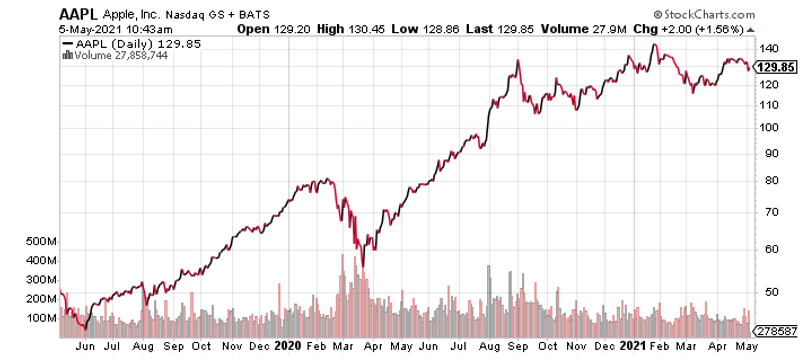Apple Inc. (Nasdaq: AAPL) and Epic Games, the company behind “Fortnite,” are in court. The legal battle is especially noteworthy because it could change the way all future digital software is distributed.
Managers at Epic Games said on Tuesday they want to undo the 30% fee Apple collects for distributing software. If they’re successful, third-party developers could launch independent platforms on top of Apple software.
To be clear, “Fortnite” is a proven commodity. The online community now has 350 million active players. Registered users in April spent a collective 3 billion hours inside the “Fortnite” universe, battling zombies and each other. The company makes money by selling advertising and hawking virtual trinkets like avatar outfits and extra lives. Epic also builds virtual communities.
Twenty-seven million people showed up last June to watch a virtual Travis Scott performance. The 10-minute concert was a kaleidoscope of rap music and color, unmoored from the laws of the physical world. “Fortnite” cleverly positions Epic at the intersection of pop culture, tech and commerce.
The business end is big.
As part of the ongoing legal battle, Epic lawyers disclosed this week that the platform had sales of $5.4 billion in 2018, $3.7 billion a year later and $5.1 billion in 2020.
Related Post: The Digital Transformation Isn’t Going Anywhere
CEO Tim Sweeney laid out a grand vision for “Fortnite” where developers and artists could build virtual businesses inside the platform. The roadblock, in his view, was the 30% fee paid to Apple.
There is an obvious problem with this legal strategy: Apple is providing a real service as gatekeeper to its operating system. While Sweeney may gripe about the 30% fee, keeping payment systems and user data secure is ultimately about trust. It’s a big part of the reason people buy Apple products. The company is entitled to charge a fee for providing that service.
There is also the problem of consistency. Epic pays the same 30% fee to game console makers Microsoft Corp. (Nasdaq: MSFT) and Sony Group Corp. (NYSE: SONY), even though gameplay on Xbox and PlayStation account for a much larger portion of “Fortnite” sales. Apple lawyers were quick to point out on Tuesday that iPhones and iPads made up only 5.5% of 2020 revenues.
It’s nice that Sweeney wants to create a kumbaya platform where creatives and Epic can collaborate to build new online businesses … but it doesn’t mean Epic gets to shun Apple rent.
Some investors assume game producers have the power to change and set the rules. They don’t. Ultimately, the real power rests with the platform gatekeepers, like Apple.
The Cupertino, California-based company has a powerful ecosystem with a billion registered devices. It’s hard to overstate the scale of this business. Customers are fiercely loyal and will often buy Apple products regardless of the limitations.
For example, the MacBook was redesigned in 2015. The new format did away with all of the input/out ports that made the laptop so popular with photographers and digital artists. The term “dongle life” was born because getting media on and off the device often required an adapter that was sold separately. The laptops still sold well, and customers bought dongles.
The “Fortnite” lawsuit is much like those early MacBooks.
When Epic Games purposefully violated Apple developer policies in August 2020, “Fortnite” was removed from the mobile App Store. Apple as a business didn’t miss a beat. Sales of iPhones and iPads have not been impacted one iota. Customers adapted.
Related Post: Video Games Play With Digital Transformation
Apple reported financial results a week ago. Second-quarter sales reached a record $89.4 billion, up 54% year over year. iPhone sales rose 66% to 47.9 billion in the quarter. Managers said iPad sales grew by 79%.
Apple shares have been under pressure since its earnings report. Some of this is fear that the business can’t possibly get any better. Another part of the weakness is about lawsuits like Epic’s that could encourage regulators to chip away at Apple’s dominant position with iPhones and iPads.
It’s a silly fear. The company is providing a legitimate service to its customers, and they wouldn’t trade it regardless of inconveniences. Longer-term investors should strongly consider using the weakness to buy Apple shares.
Best wishes,
Jon D. Markman




